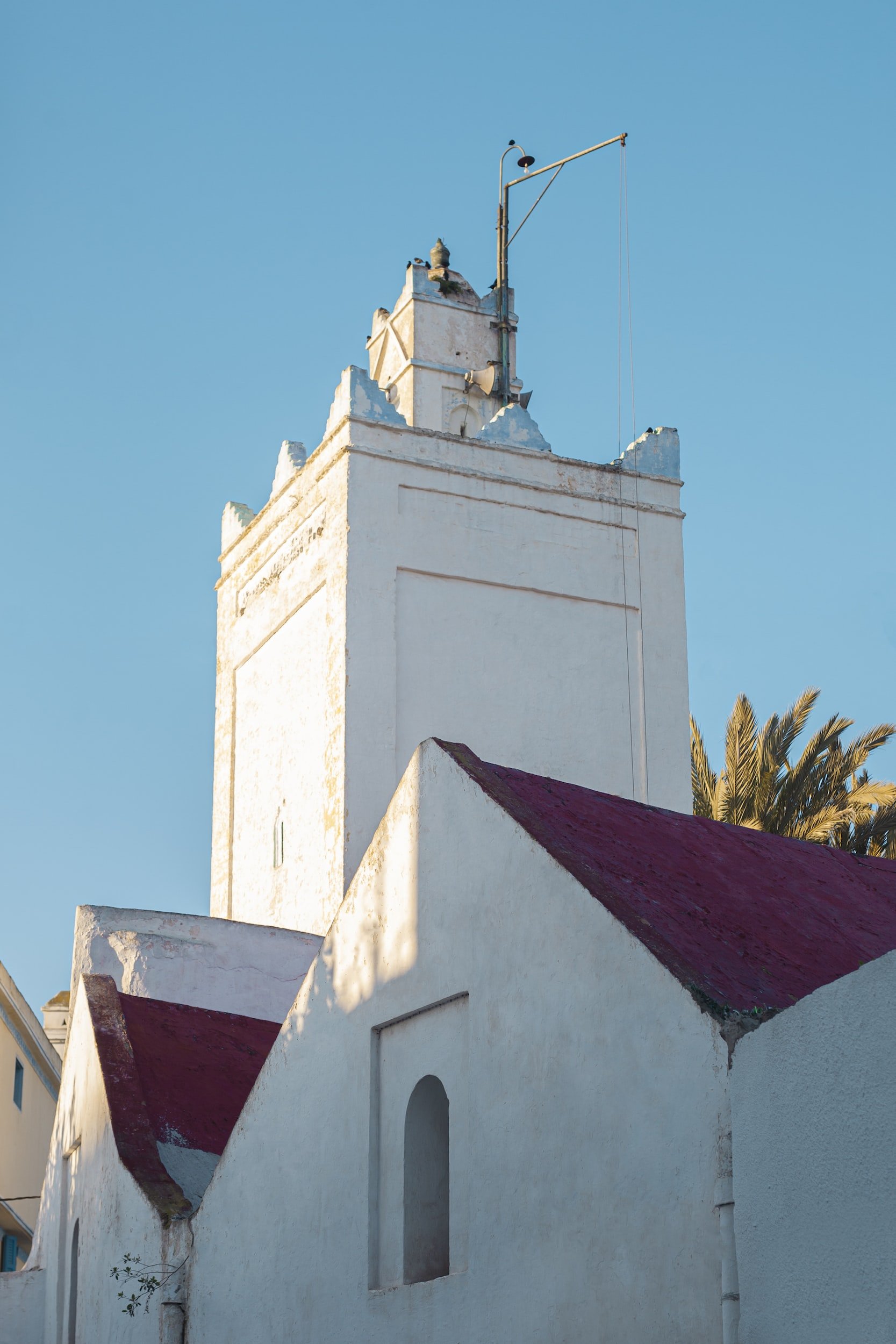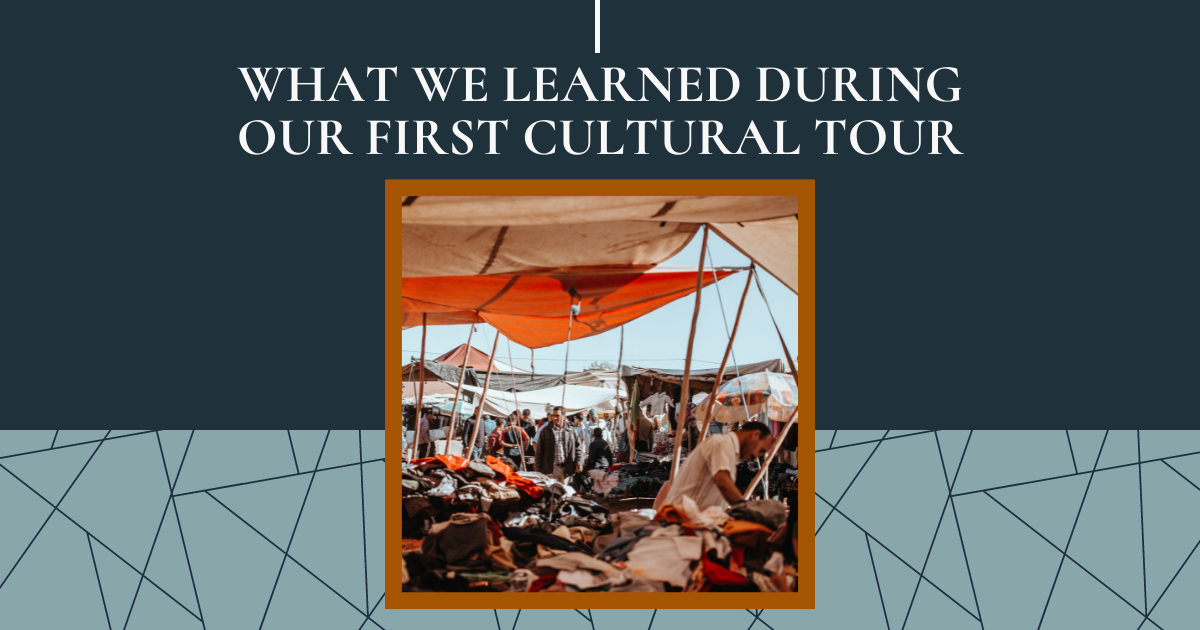Cultural Stories: The Language of the Birds
William Gudykunst said, “One of the major factors influencing our effectiveness in communicating with people from other cultures is our ability to understand their culture.” Communication is about more than just the words we say; it is about both language and culture, what we communicate through words and actions. Here at Crossroads Cultural Exchange, we believe that we can't separate learning language from learning culture. As one of out teachers says, "Culture is the spirit of a language."
In my first year of learning Moroccan Arabic, I greatly appreciated that my teachers taught me not only grammar and vocabulary, but also cultural proverbs, teachings, and stories. The stories especially taught me things that were under the surface of Moroccan culture. Now, that same teacher who told me that "Culture is the spirit of a language” has shared with a me a book of Moroccan fairy tales, called Tales of Fes, translated by E. Powys Mathers. Reading and reflecting on the fairy tales, myths, folktales, proverbs, and sayings from another culture helps us gain insight into that culture in ways we otherwise may not glean. Let’s look together at one such tale, called The Language of the Birds, taken from Tales of Fes.
The Language of the Birds
Once upon a time there was a rich merchant in Fez who was in despair because he had no child. Also, his advanced age seemed to forbid him any hope in this respect. But his desire was so great that he asked one of his friends, who lived at a great distance, to come to visit him and to give him advice. This friend was a magician. When he had consulted his art, he said, “You will have a son.”
For he knew of the existence, in a far country, of a tree whose fruit infallibly rendered the eater highly fertile.
So he turned the ring of wisdom upon his finger and thus caused two colossal black men to appear before him, powerful Afarit, whose feet were founded upon the earth and whose heads touched the tall sky. [Afarit are a powerful type of demon in Islamic mythology. They are often associated with the underworld and also identified with the spirits of the dead.]
“Why have you called us?” they cried in a menacing tone. “What work have you got for us? Command and we shall obey.”
Then, on the magician’s order, they departed and plucked the fruit of the supernatural tree, which they brought back to the merchant and his wife, who both ate heartily of it.
Nine months afterwards a handsome boy was born, and his father took care to provide him with an excellent education at the best Msid [Quranic school] in the city.
When the boy was ten years old, the merchant took him with him upon pilgrimage to Mecca. But before they arrived and while they were visiting a certain city of Egypt, they passed in front of a very strange msid: through the delicately-carved lattice-work the pupils might be heard speaking in an unknown tongue. Father and son could distinguish nothing but “tiu tiu tiu kiwit kiwit tiu tiu tiu tiu …”
“That is the language of the birds. I teach it to my pupils,” answered the fqih [expert in Islamic law] proudly, when the two strangers questioned him.
Allured by this original form of instruction and desirous of having his son grounded in every branch of learning, the merchant trusted the child to the old professor, giving him six little bags of gold to pay his fees until the day when he himself, having accomplished his pilgrimage, should return to take him back to Fez.
But two years passed and the father did not return. He had forgotten the way and had arrived at his own home without his son.
“He fell into the sea,” he explained to his wife, who thereupon became almost blind through weeping.
The merchant was a careless and self-centered man, and so, being absorbed in his business, he forgot his son for the whole of ten years, always putting off until the morrow that day on which he would set out to search for him. Yet a time came when he did at last go forth again on pilgrimage. He was more fortunate this time; he found the city and the street and the msid. He heard “tiu tiu tiu kiwit kiwit” once more; but he did not recognize the professor.
Instead of the old man whom he had left, a very handsome youth of twenty was teaching the class. The merchant made inquiries and found that the master had stayed at home that day from illness, and that the best pupil was taking his place. When the old man had been fetched, he said, pointing to the young teacher:
“Do you not recognize your son? This is he whom you confided to my care ten years ago. He has become so learned that he can in all things take my place.”
The joyful merchant clasped his son in his arms and then, after thanking the old master, said farewell to him, with a present of new bags of gold to console him for the departure of his helper.
The two now took a boat for the Moghreb el Aqsa, and when they had been for some time in the open sea, three birds came to perch on the nettings and began to sing.
“What are they saying?” asked the father, but his son did not care to answer.
“Chi chi chi tiu tiu tiu,” cried the birds.
“Why will you not tell me what they are singing?” insisted the father, and many other rich men of Fez who were journeying with him began to mock him, saying, “It seems most profitable to pay money for the instruction of a son! Why spend ten years in studying the language of the birds and then fail to interpret the very first birds that come to hand?”
So, much against his heart, the young man gave way, and cried, “You insist on knowing what they say? Very well, dear father. They say that I shall become a Sultan some day and you a zarzaї [porter].”
This prophesy was by no means to the old man's taste, but he said nothing at the time. Yet he ruminated silently on his anger, and with such deep brooding that, when night fell, he went down into the hold, emptied once of his chests of its merchandise, and fastened his sleeping son within it. Then, when he had carefully closed down the lid, he threw the whole thing overboard.
“At least,” he grumbled, “I shall not be lying to my wife this time when I say he fell into the sea. That will be God’s truth.”
And the ship continued on her way towards the Fortunate Empire.
When he came to the city of Moulay Idris, the old merchant found that his house had been completely burnt to the ground; and it took him several days to discover his wife, who had had to become a sabbana [washer-woman] to gain her bread. After these two ancient people had dragged out a miserable existence for some time, they decided to leave the medina; broken by age and worn with grief, they crossed Bou Jloud, passed under Bab Segma, and went forth to find their fortune in some other place. So much for them.
There was, during that time, a certain poor fisherman who lived in a town by the sea and scarcely contrived to earn his livelihood. On a particular day he was in a very bad temper, because his wife had just given birth to a daughter. A daughter—that is to say, a mouth to feed and no honorable incentive to do so. To put a crown upon his misfortune, he fished from sunrise and his net brought him in nothing. Therefore, in his discouragement, he climbed up again to the beach and sat there on the sand, with his head between his palms.
Lifting his eyes, all of a sudden, the fisherman saw a large chest floating upon the waves and being carried towards the shore. He therefore got back into his boat and, setting out towards this stray, brought it immediately back to his house. When his wife and himself at last succeeded in opening their booty, they saw that it contained a handsome young man dressed in rich garments.
“Ins aou jinn? Are you man or jinni?” they cried in their astonishment.
“I am a man of flesh and bone even as you are; therefore do not fear me,” said the young man, and while they comforted him with a very hot soup and showed him all sorts of attention, springing from pure pity, he continued, “You are henceforward my only parents. See, here is money which I had stowed away in my satchel. Take it, and also sell these expensive garments, since I have no use for them.”
Now this young man, who had been born, as must be remembered, under marvelous conditions, and educated in an exceptional manner, was a Luck-Bringer. He carried good fortune with him.
From the day on which the youth began to live at the fisherman’s house, that good man always had excellent catches, and joy dwelt in the home. And the young man, for his part, being very learned, frequented the schools and the mosques and the Qaraouiyine University, and became the intimate friend of the cadi’s [judge’s] son.
Now the Sultan of that place was considerably annoyed. Every day while he was sitting among the people of his court, three birds would come about him and vivaciously chatter for several moments, but only after having–O abomination!--done their needs on the head of Sidna [the Sultan] himself.
The Sultan had offered half of his kingdom to anyone who would deliver him from this calamity; but death was to be the penalty of one who should make the attempt and fail. Many persons had thus had their heads cut off, and none had been able to explain the mystery. Therefore, as the cadi bore the reputation of being very learned, the Sultan sent for him and gave him eight days in which to arrange the matter.
We can imagine that it was in a state of much depression that the unfortunate cadi left Dar el Makhzan. At the Qaraouyine University where he taught, he cut short the time of his class, and all his pupils remarked on his anxiety.
When he had returned home, he put his affairs in order as if he were presently to die, and told his son of the Sultan’s bidding.
That evening the fisherman’s adopted son, the young man who had been saved from the waters, met his young friend, and noticed his sadness. He asked him concerning it, and learnt of the doom which hung over the cadi’s head.
“If it be only that,” he said, “do not torment yourself. I will get you clear of the business. It is useless to wait for eight days. Let your father present himself before the Sultan tomorrow, and I will go with him.”
The next day, he stood with the cadi in the palace, he saluted the Sultan three times and then asked him if he would give him half of his kingdom in case of success. The three birds had already come and were beginning to chatter.
“Yes,” said Sidna.
“Let the notaries come, then, to register the deed of gift,” said the prudent young man, and when this had been done, he began to speak with the birds. It sounded an incomprehensible exchange of “tiu tiu tiu-kiwit-chi chi chi-tiu tiu tiu.”
“They ask justice,” he said at length, turning towards the king. “They are two males and one female. This one on the left is from the East, and this other is from the West. The female belonged to the latter, but he was absent for a very long time on a journey. Thinking him dead, she married the other and lived with him for a year. They demand that the Sultan should decide upon their case.”
But the Sultan felt himself very embarrassed.
“If you wish, O Prince of Believers, I will give judgment in your place, and all shall be made plain.”
When the Sultan acceded to this suggestion, the young man said to the bird who came from the East, “Go towards the East!”
To him who came from the West, “Go towards the West!”
And to the female, “Follow the one you love!”
When the two male birds had obeyed, the female followed her first husband into the West without a moment’s hesitation.
All who were present became filled with marvel, but the Sultan regretted that he had to give half his kingdom away for a few “tiu tiu tius,” and was not ready to sign the act which the notaries had drawn. Then the young man threatened to call all the birds of the world to that place, that they might behave upon Sidna as the first three had done.
Indeed he called out certain orders in the language of the birds, and immediately the Sultan saw the sky growing dark, above his head. All the birds of every kind from every land of all the earth were assembled above that court; and there was a fine concert of “tiu tiu tius.” Then said the young man, “I will order them all together to do their businesses upon you if you do not fulfill your promise.”
The Sultan had to yield, and the birds departed. Nor did the royal ill-humour continue, for the young man was so amiable and seductive that none might help loving him. He caused the fisherman and his wife to be brought to the palace and dressed in the dresses of kings and of king’s sons, and they gave thanks to heaven that they had been granted this most fortunate youth. Seven days afterwards the old Sultan died, leaving the kingdom to the young man who understood the language of the birds.
In the meantime his real parents, who had left Fez in their ruin, had come at last to that very city.
“Try to get work as a zarzaї,” the old woman advised her husband. “I will myself again become a washer-woman. We can meet this evening.” And with that the old man went to the small square near the ramparts, where those who wished to be hired as porters used to wait for work.
On that same day the Sultan bade his master of the palace to have wood laid in for the Winter. Therefore the master of the palace told his eunuchs to go out and engage porters for this work. Thus it was that the father became, according to the prediction of the birds, a porter in that city where his son was Sultan.
The old man was not at all accustomed to manual work, for, in his whole life, he had hardly ever done anything except sell goods and count over money. Therefore, the eunuch, who was overseeing his labor, saw that he did his task badly and gave him a few lashes with the whip to encourage him, while the two went on towards the palace.
The Sultan, who was reclining upon the terrace, recognised his father. He would doubtless have liked to know the old man’s reason for throwing him into the sea, but his heart was too generous to nurture thoughts of revenge. Seeing his frail old father staggering under the blows of the eunuch, he sent down a message bidding them exchange their parts.
Thus the porter took the rope and eunuch the burden. Now, as the father was a much less generous man than his son, he gave back many more blows than he had received and was lashing his persecutor furiously when the two entered the palace. But, when a further order was brought from the Sultan that he should be led into the great hall, he began to be afraid and asked himself if he were not going to be punished for having ill-treated a royal servant. While he was busy with such thoughts, the Sultan entered and began to question him concerning his existence.
“Have you a family, a son, a wife?” This he asked because he wished to have news of his mother.
“I have never had a son,” said the old man, whose conscience was not very clear upon this point. “But I have a wife who is very old and feeble and does washing.”
“Go and fetch her,” ordered the Sultan of two of his eunuchs.
These were not very pleased at this command, since its execution would not bring them anything, but the order was a formal one. After a long search in every place, they managed to find a house where a strange washer-woman had just been employed, and returned to the palace with the old woman.
All who are concerned in this story were thus brought together.
“Poor woman,” said the Sultan in deep emotion. “What misfortune has brought you down to this?”
“Atlas, O Sultan, my husband has caused all our grief by losing our son.”
“Would you recognise your son?”
“Yes, yes, Lord! He has a beauty-spot on his right shoulder.”
Immediately the Sultan undressed, showing his bare right arm, and embraced his mother, who wept exceedingly in her joy. He pardoned his father, and ordered slaves to wash the two old people at the hammam and to dress them in the garments of kings and the sons of kings.
Henceforward he lived with his real and his adopted parents; his reign was a long one and in every way fortunate for his subjects.
Questions for Reflection
1. In this story, the fisherman was not happy when his wife gave birth to a girl. This kind of thinking and feeling existed, and still exists in Arab societies. People believe that giving birth to a girl is less important than having a boy because a boy is likely to take the family name of his father and will inherit the parents’ wealth. What do you think about this idea? Do parents feel any different when they have a boy or a girl?
2. In Moroccan culture it is believed that mothers are kinder than fathers. This is clear in the story when the boy (the hero) was treated unkindly by his father, while his mother lived in grief because of the loss of her son. Does a similar idea exist in your culture?
3. Although the father was severe and unkind to his son during the events of this story, the son pardoned him at the end. What do you think about the son’s behavior towards his father?
Do you enjoy this type of cultural exploration? You may enjoy one of our Moroccan cultural workshops, available online or at our center in Fes.
















Morocco is a very unique country for several reasons. The first is its strategic location in the northwest of the continent of Africa, just 14 kilometers south of Europe. This beautiful country is bordered by the Mediterranean Sea in the North, the Atlantic Ocean in the West, Algeria to the East, and Mauritania to the South. For this reason, Morocco is a crossroads where cultures, civilizations, and ethnicities meet.